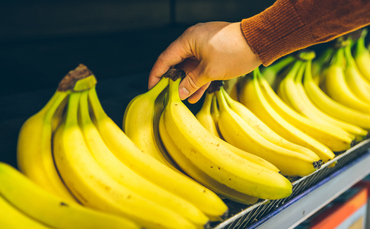A coalition of British supermarkets are in talks with the Fairtrade Foundation to establish a “buying coalition” to purchase ethically and sustainably sourced goods from farmers in developing countries, after the Competition and Markets Authority (CMA) issued guidance indicating the proposed move would not breach anti-competition laws.
According to reports in The FT and City AM, Sainsbury’s, Tesco, and the Co-op are in talks about participating in the scheme, which could provide a major boost to demand for a range of sustainable certified goods, such as bananas, coffee, and cocoa. A pilot scheme is reportedly already underway.
The objective of Fairtrade’s Shared Impact Initiative is to establish longer-term supply arrangements between retailers and participating producers to provide farmers with the security they need to invest in sustainable practices, including technologies and techniques that reduce the environmental impact of production.
Under the scheme, farmers in countries such as Ivory Coast, Ghana, Kenya, and Colombia would be offered three-to-five-year contracts with a coalition of retailers so that they can invest in practices to combat the impact of climate change, Fairtrade and the CMA said.
Informal guidance issued to Fairtrade in November found the scheme is unlikely to raise competition concerns and would likely result in additional availability and choice of products for UK consumers. As such, the competition watchdog said it “does not expect to take enforcement action” against the proposed initiative.
Consequently, Shared Impact Initiative-sourced goods could be on the shelves of British supermarkets within months, according to reports.
The CMA added that if the initiative is successful in achieving its objectives there is the potential for it to be expanded in the future.
“Farming remains one of the main drivers of deforestation globally, as well as a significant contributor to an increase in global greenhouse gas emissions and biodiversity loss. Farmers and workers cannot drive forward sustainability initiatives without supply chain collaboration,” Alexander Carnwath, head of public affairs at the Fairtrade Foundation told City A.M.
“That’s why Shared Impact is a joint pledge between farmers, retailers and Fairtrade. Expanding on the existing way we work with our retail partners, the new model allows them to target salient risks in their supply chain, drive forward a more resilient food sector, work together to advance shared goals, and fund real, lasting change in partnership with farmers and workers.”
The update follows the release of studies exploring the impact of the El Niño weather event on cocoa yields in West Africa, and subsequently chocolate Easter egg prices, and warning unseasonal weather in Brazil and Vietnam has fuelled fears of a weak harvest, pushing up coffee prices on global markets. Moreover, a new report published by Christian Aid has claimed avocados could be the latest foodstuff to be “smashed” by the climate crisis, with areas deemed suitable for growing the superfood expected to contract by between 14 and 41 per cent by 2050.
Escalating climate impacts have ramped up pressure on farmers to invest in more climate resilient and sustainable practices. But experts have warned many smallholder producers of agricultural commodities lack the financial resources necessary to invest in more sustainable approaches.
Emily Pearce, the Co-op’s senior sustainable sourcing and international development manager, said the pilot initiative aimed “to find solutions to deepen the impact, cooperatively for the millions of small-scale farmers and workers who are disproportionately affected by the effects of climate change and fluctuating commodity prices”.
“We recognise the real challenges facing food systems across the world and are pleased to be participating with Fairtrade on the Shared Impact pilot,” she added.
Keep up to date with all the latest green business news by signing up to the free Daily and Weekly BusinessGreen Newsletters.

